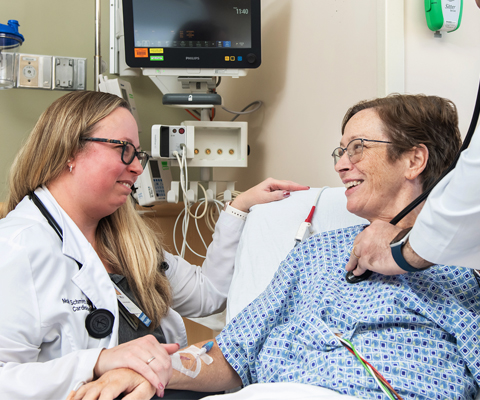Delivering innovative, patient-centered cardiac care, Bayhealth continues to raise the bar in the treatment of heart valve disease. Since introducing its Transcatheter Aortic Valve Replacement (TAVR) program in 2016, Bayhealth has provided a minimally invasive solution for patients suffering from severe aortic stenosis, offering an alternative to traditional open heart surgery.
In a groundbreaking achievement, Bayhealth Hospital, Kent Campus has become the first and only hospital in Delaware to receive national TAVR certification by the American College of Cardiology (ACC)—a recognition that places them among fewer than 50 elite hospitals in the nation.

What is Aortic Stenosis and Why is It So Dangerous?
Aortic stenosis is one of the most serious and prevalent types of heart valve disease, especially among older adults. It affects more than 20% of Americans over age 65.
Causes and Symptoms of Aortic Stenosis
The condition develops when calcium deposits build up on the aortic valve over time, narrowing the valve opening and restricting blood flow from the heart to the body. As a result, the heart must work harder, which can lead to:
- Chest pain
- Shortness of breath
- Fatigue
- Dizziness or fainting
- Difficulty with physical activity
Many individuals may not experience noticeable symptoms until the disease has progressed significantly, making early diagnosis and treatment essential.
Without Treatment, Aortic Stenosis Can Be Fatal
Left untreated, severe aortic stenosis can lead to heart failure and even sudden death. That’s why timely and effective intervention is critical.
The Rise of TAVR: A Game-Changer in Cardiac Treatment
For decades, the gold standard for treating aortic stenosis was open heart surgery—an invasive procedure involving long recovery times and higher risks, particularly for elderly or medically fragile patients.
Bayhealth’s TAVR program offers a less invasive, highly effective alternative. TAVR involves threading a replacement valve through a blood vessel, often in the upper leg, and placing it inside the damaged aortic valve—all without opening the chest.
Key Benefits of TAVR Include:
- Shorter hospital stays
- Minimal to no scarring
- Reduced risk of complications
- Faster recovery—often within a few weeks
- Improved quality of life
Many patients report feeling more energetic and active shortly after the procedure—often regaining the ability to perform daily activities they had previously struggled with.
Bayhealth’s National TAVR Certification: What It Means
Bayhealth’s recent certification by the American College of Cardiology represents the gold standard in cardiac care. The TAVR certification program evaluates hospitals based on:
- Multidisciplinary collaboration
- Evidence-based practices
- Patient outcomes and satisfaction
- Registry participation and performance
- Formal training programs and continuing education
A Team Approach to Lifesaving Care
Bayhealth’s TAVR team brings together highly skilled professionals—including cardiothoracic surgeons, interventional cardiologists, anesthesiologists, nurses, and care coordinators—who work closely to customize care for each patient.
Personalized Planning for Every Patient
Every TAVR case begins with a detailed evaluation to determine:
- The best approach for valve access (usually through the femoral artery)
- The most appropriate type of anesthesia (often local sedation)
- The patient’s lifestyle goals and health concerns
A Smoother, Faster Recovery Process
Thanks to streamlined pre-evaluation, improved surgical techniques, and advanced recovery protocols, most TAVR patients at Bayhealth:
- Experience shorter procedure times
- Spend less time in the hospital
- Go home the next day following their procedure
This efficient and compassionate approach to care ensures that patients receive not only world-class treatment but also a high-quality recovery experience.
Helping More Patients Stay Local for Heart Care
Before Bayhealth launched its TAVR program, many patients in Delaware had to travel out of state for advanced valve replacement procedures. Now, thanks to Bayhealth’s certified program, patients can receive top-tier cardiac care close to home.
Frequently Asked Questions:
1. What is TAVR and how does it work?
TAVR (Transcatheter Aortic Valve Replacement) is a minimally invasive procedure to replace a damaged aortic valve without opening the chest. It’s performed using a catheter inserted through a leg artery to deliver and implant the new valve.
2. Who is eligible for TAVR?
TAVR is often recommended for patients with severe aortic stenosis who are at high risk for traditional open heart surgery. A detailed evaluation by a heart team determines eligibility.
3. What are the benefits of TAVR over open heart surgery?
Benefits include less pain, faster recovery, shorter hospital stays, and reduced complications. Many patients return to normal activity within weeks.
4. Is TAVR performed under general anesthesia?
Not always. Some patients receive local anesthesia with sedation, meaning they’re awake but relaxed and pain-free during the procedure.
5. How long is the recovery time after a TAVR procedure?
Most patients recover within a few weeks, and many are discharged the day after the procedure. Recovery depends on individual health and risk factors.




